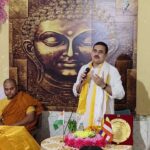DISPELLING THE HAZE OF ‘MODERNISATION’
- By : Anirban Ganguly
- Category : Articles
The present initiative to bring about a larger awareness and determination to achieve national cleanliness is a welcome return to our values and traditions
A high state of order, sublimity and well-functioning local institution has usually been expressive of an advance civilisational stage. To a number of observers, India appeared as such throughout the ages. It may be periodically useful to recollect these past perceptions, were gradually lost to us. It is said that the “conquest and defeat of a civilisation generally leads not only to its disintegration” but also to the “disappearance of precious knowledge associated with it.” The disappearance of that precious knowledge remains a crucial and formidable road-block in any nation’s quest for recovering a deeper and a larger sense of self-hood.
An Englishman’s description of “Hindoo” society, as he saw it in the early 1790s, when colonial system had not begun to extract and ravish the land and its indigenous frameworks, makes a fascinating reading of our collective self and capacities. In his “Sketches of the Hindoos” (1790, 1792), Q Craufurd, for example, noted that where the “destructive hand of the conqueror” had not fallen, the Hindoos, under their “native sovereigns” were “governed on principles of the most just and benevolent policy. In those countries (local principalities) the lands were highly cultivated; the towns and their manufacture flourish; the villages were composed of neat and commodious habitations, and filled with cheerful inhabitants; and wherever the eye turned, it beheld marks of the mild protection of the Government, and of ease and industry of the people.” Craufurd saw this especially in the southern parts, a region which had remained relatively insulated from invading hordes.
Systems in place ensured that even some of the basic requirements were catered to by a well-laid out system of public conveniences, as Craufurd recorded, “the traveller was enabled to journey through this immense country with ease and safety; the public roads were shaded with trees to protect him from the scorching sun; at convenient distances buildings were erected for him to repose in…hospitality and laws held out assistance, protection to all alike, without prejudice or partiality.”
The memory of these past entrenched positive characteristic at times aid in present initiatives and aspirations at self-excelling, not compulsorily, but usually if one is determined to derive a rational dynamism from the past achievements, the descriptions of which, over the centuries, have been gradually hidden from us. These descriptions and perceptions of India were deliberately omitted so that generations grew up reading a history which Rabindranath Tagore described as a “dismal chronicle of India’s repeated defeats and humiliations in her political competition with foreigners from Alexander to Clive.” The “grandeur of the physical beauty of India” and of her moral greatness were lost to young India which was compelled to spend days, as the poet observed, “in the dark corners of the history our national humiliation which was the then text-book of Indian history…” Such history was meant to fade away the memory and even practices of a vibrant civilisational past and to replace it with a faltering and uncertain sense of national capacities and abilities.
Empirical evidences abound of the highly refined achievements and characteristics of Hindu society of the past. History records, since time immemorial, how well-laid our cities were, standing not in defiance of but in deference to nature. Cleanliness, orderliness and sensitivity have always been some of its dominant traits and manifestations, whatever may be its present challenges. A British painter William Hodges, for example, who travelled across India between 1780-83, was struck by a “surprising spirit of cleanliness” among Indians, “the streets of their villages are commonly swept and watered, and sand is frequently strewed before the doors of the houses.”
The present initiative to bring about a larger awareness and determination to achieve national cleanliness is thus an effort to bring to efflorescence a deeply intrinsic Indian habit, the memory of which we have lost in a debilitating haze generated from an ill-regulated and eventually all-consuming fire called modernisation.

















